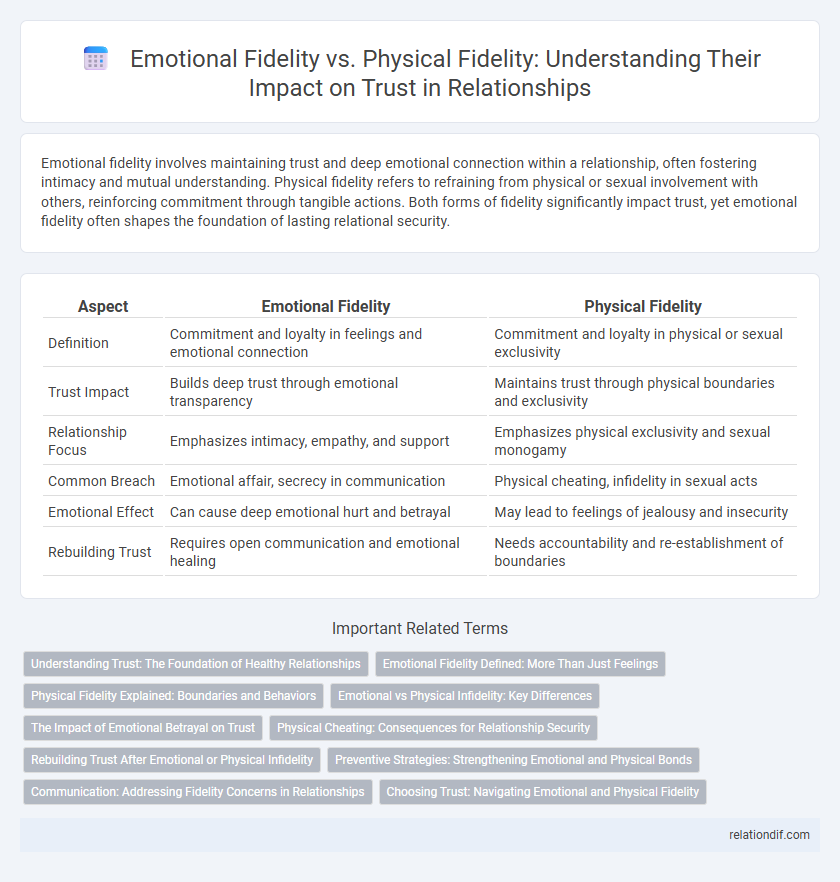Emotional fidelity involves maintaining trust and deep emotional connection within a relationship, often fostering intimacy and mutual understanding. Physical fidelity refers to refraining from physical or sexual involvement with others, reinforcing commitment through tangible actions. Both forms of fidelity significantly impact trust, yet emotional fidelity often shapes the foundation of lasting relational security.
Table of Comparison
| Aspect | Emotional Fidelity | Physical Fidelity |
|---|---|---|
| Definition | Commitment and loyalty in feelings and emotional connection | Commitment and loyalty in physical or sexual exclusivity |
| Trust Impact | Builds deep trust through emotional transparency | Maintains trust through physical boundaries and exclusivity |
| Relationship Focus | Emphasizes intimacy, empathy, and support | Emphasizes physical exclusivity and sexual monogamy |
| Common Breach | Emotional affair, secrecy in communication | Physical cheating, infidelity in sexual acts |
| Emotional Effect | Can cause deep emotional hurt and betrayal | May lead to feelings of jealousy and insecurity |
| Rebuilding Trust | Requires open communication and emotional healing | Needs accountability and re-establishment of boundaries |
Understanding Trust: The Foundation of Healthy Relationships
Emotional fidelity involves maintaining honesty, transparency, and deep emotional connection, which strengthens trust and creates a secure bond in relationships. Physical fidelity focuses on sexual exclusivity but without emotional commitment can undermine long-term trust and intimacy. Understanding trust as the foundation of healthy relationships requires prioritizing emotional fidelity to foster mutual respect, vulnerability, and lasting connection.
Emotional Fidelity Defined: More Than Just Feelings
Emotional fidelity refers to the steadfast commitment to understanding, validating, and sharing a partner's inner emotional world, fostering deep trust and connection beyond physical interactions. It involves consistent emotional availability, empathy, and transparent communication, which strengthen relational bonds and prevent misunderstandings. Prioritizing emotional fidelity creates a foundation for long-term intimacy that surpasses mere physical presence or attraction.
Physical Fidelity Explained: Boundaries and Behaviors
Physical fidelity in relationships refers to maintaining clear boundaries and consistent behaviors that honor the exclusivity of physical intimacy. It encompasses acts such as refraining from physical contact or sexual interactions with individuals outside the committed partnership, reinforcing trust through visible and tangible actions. Adhering to agreed-upon physical boundaries solidifies trust by demonstrating respect, loyalty, and accountability within the relationship.
Emotional vs Physical Infidelity: Key Differences
Emotional fidelity centers on maintaining a deep emotional connection and trust, where emotional infidelity involves developing intimate feelings for someone outside the primary relationship, often leading to feelings of betrayal. Physical fidelity pertains to sexual exclusivity, with physical infidelity marked by physical acts with someone other than the committed partner, breaching the agreed boundaries. Understanding these distinctions highlights how emotional infidelity can be as damaging as physical infidelity, affecting trust and relationship stability differently but profoundly.
The Impact of Emotional Betrayal on Trust
Emotional betrayal significantly undermines trust by violating the intimate connection and vulnerability shared between partners, often causing deeper psychological damage than physical infidelity. Studies reveal that emotional infidelity triggers intense feelings of insecurity, jealousy, and emotional pain, leading to long-lasting erosion of relational trust. Repairing trust after emotional betrayal requires consistent transparency, empathy, and emotional rebuilding to restore the foundational sense of safety in the relationship.
Physical Cheating: Consequences for Relationship Security
Physical cheating severely undermines relationship security by breaking the essential trust between partners. The breach often leads to emotional distress, increased insecurity, and a heightened risk of separation or divorce. Repairing trust after physical infidelity requires extensive communication, transparency, and commitment to rebuilding emotional safety.
Rebuilding Trust After Emotional or Physical Infidelity
Rebuilding trust after emotional or physical infidelity requires consistent transparency and open communication to address underlying insecurities and restore emotional security. Emotional fidelity breaches often demand deeper emotional reconnection and reassurance, while physical infidelity necessitates setting clear boundaries and accountability to prevent recurrence. Prioritizing empathy and professional counseling can enhance recovery by fostering mutual understanding and long-term commitment restoration.
Preventive Strategies: Strengthening Emotional and Physical Bonds
Strengthening emotional fidelity involves open communication, empathy, and consistent emotional support to build a resilient trust foundation. Enhancing physical fidelity requires setting clear boundaries, mutual respect, and prioritizing physical intimacy as a core aspect of the relationship. Preventive strategies combining these elements promote lasting trust by addressing both emotional connection and physical commitment.
Communication: Addressing Fidelity Concerns in Relationships
Open and honest communication plays a crucial role in addressing emotional fidelity versus physical fidelity concerns in relationships. Expressing feelings and boundaries clearly helps partners understand each other's expectations and insecurities, reducing misunderstandings and strengthening trust. Utilizing effective dialogue techniques fosters transparency, enabling couples to navigate fidelity challenges with empathy and mutual respect.
Choosing Trust: Navigating Emotional and Physical Fidelity
Choosing trust in relationships involves understanding the distinct yet interconnected roles of emotional fidelity and physical fidelity. Emotional fidelity builds a foundation of deep connection and mutual respect, fostering honest communication and vulnerability. Physical fidelity reinforces that bond through consistent actions, ensuring reliability and security within the partnership.
Emotional fidelity vs Physical fidelity Infographic

 relationdif.com
relationdif.com